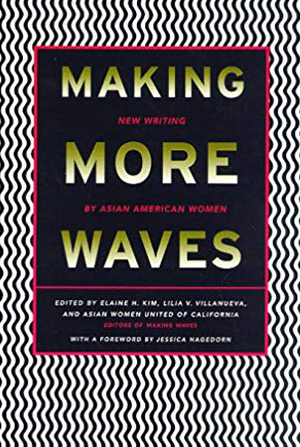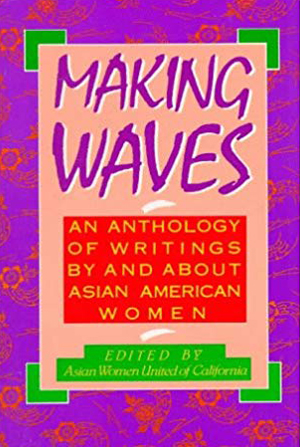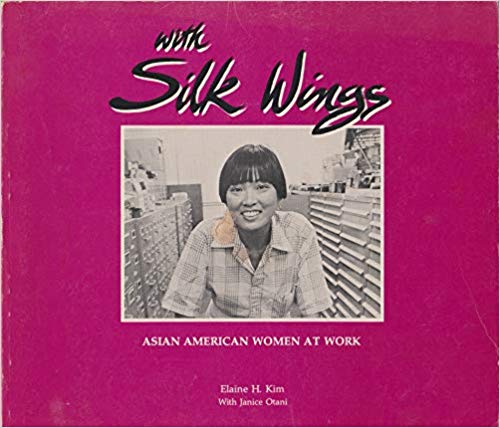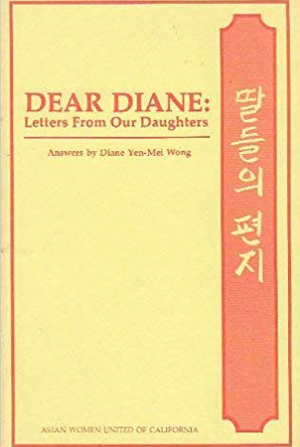Publications
Scroll down for the full list of AWU publications.
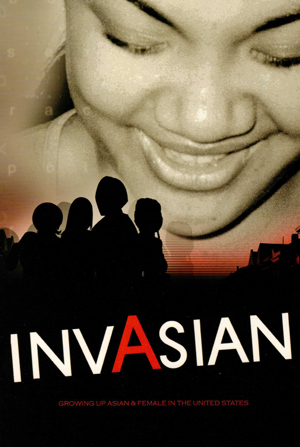
InvAsian: Asian Sisters Represent
Edited by Marjorie Biggs, InvAsion is a breathtaking collection of 66 poems and stories by diverse APA women, from young girls struggling with identity to long-established voices searching for truth.
InvAsian Reviews:
“Impressively presented collection…A memorable, rewarding and insightful read, InvAsian is a seminal work…highly recommended contribution to Women’s Studies in general and Asian/American Studies in particular.”
— The Midwest Book Review, June 2003
“A fabulous collection…
— AsianWeek.com, April 30, 2003
“Busts every stereotype in the book about Asian American women…rich with witty, entertaining, and sometimes heartbreaking essays and poems.”
— S.F. Weekly, April 30 – May 6, 2003
This collection of poetry and prose explores the issue of being Asian American and female in the United States.
— Filipinas, July 2003
InVasian Forward
I couldn’t sleep the night before my 20th birthday. I just knew that the next morning, when the “-teen” dropped from my age, I would be forever transformed into someone more mature, more responsible, more… well, into an ADULT. I’d encountered the same restlessness rumbling under my chest many times before—in the still and nervous moments before my house awakened each Christmas morning, as I clutched the steering wheel before my driver’s test, as I stared at the clover flowers on the soccer field before my first kiss, when the door clicked as my parents walked out of my dorm room the day I moved into college.
So. You can imagine my surprise when I awoke the next morning, feeling like the exact same girl. That was six years ago, and some things still haven’t changed.
Don’t get me wrong—there have been plenty of new things to excite me, to break my heart, to worry about, and to hope for. But I still read fashion magazines and wonder what I’d do with Gwyneth Paltrow’s wardrobe, or a runway model’s height. I now live 600 miles away, but when I go home, my parents still ask me where I’ve been, who I was with, and when I will become a doctor. I still get butterflies when I’m around someone I like. I still get zits (aargh!). I still have dreams.
Thank goodness growing up doesn’t have to happen overnight. It’s overwhelming enough already. And if you’ve grown up with parents or grandparents from another country, or with strangers always asking you where you’re from, or without seeing too many actresses, or senators, or singers, or athletes who look like you, then you know it can seem overwhelming, TIMES TEN. That’s why this book is for YOU.
You won’t find what we’ve collected here in beauty magazines or music videos. Your teachers aren’t going to tell you about the thoughts and emotions you’ll encounter within these pages. This book is about the things that we see and understand as only Asian girls do. It affirms what you’ve known deep down, all along—that our identities pit us against challenges that other people don’t have to deal with, but that we are more than capable of conquering them with attitude and with grace, because we are female and we are Asian in America.
Be forewarned. Once you choose to flip through these pages, you make the decision to come face to face with the complicated and the diverse, the painful and the beautiful—to confront the courageous and unforgettable emotions, images, and voices of your Asian American sisters. You’ll begin to envision yourself and the heritages you’ve inherited in new ways. You’ll laugh and cry out loud, seeing your pain, your anxieties, your exhilaration, your confusion, and your pride reflected in our stories and poems. You will be infuriated, comforted, inspired. Your inner creator/artist/storyteller will be awakened, and she will invade your soul and stir your imagination.
A-ha! We’ve got you already! There’s no turning back now; so just sit back, and enjoy this ride while it lasts.
Making More Waves: New Writings by Asian American Women
Paperback: 340 pages; Publisher: Beacon Press; ISBN: 0807059137; (July 1997)
Asian-American women writers of all ages explore a complex range of identities through poetry, fiction, essays, and memoirs, most of which have never been published. The contributors take on little explored topics and expand the limits of ethnic-based identity, resisting stereotypes and breaking silences. Candid and memorable, their essays, stories, and poetry change popular assumptions and engage readers.
Making Waves: Writings By and About Asian American Women
Paperback: 481 pages; Publisher: Beacon Press; ASIN: 0807059056; (July 1989)
Making Waves: Writings By and About Asian American is one of the first collections of essays, poetry, short fiction, and memoir by and about women of Chinese, Filipina, Japanese, Korean, Southeast Asian and South Asian ancestry. Edited by a collective that includes Emily Cachapero, Chung Hoang Chuong, Elaine H. Kim, Janice Mirikitani, Jane Singh, and Judy Yung and with an introductory essay by Sucheta Mazumdar, Making Waves has been a foundational text in women’s studies classes across the country for the past decades.
From Publishers Weekly:
This potent, fertile collection of fiction, poetry and essays by 53 Asian-American women challenges stereotypes of female docility and subservience that stigmatize those whose roots are in China, Japan, the Philippines, Vietnam, India, Korea, etc. Only a few of the startlingly forthright voices are well-known outside the Asian-American literary and scholarly milieus: Cathy Song, for example, won the 1983 Yale Series of Younger Poets award and Kitty Tsui is a widely read poet in feminist circles. Yet all have messages to convey, and do so in the incandescent language of those struggling for survival in a hostile environment. Contributors here discuss the realities of immigrating to an alien land; the history of Asian-American women’s work in the trades and professions; anger at injustices they confront as women and as Asians; and the activism that has helped them to discover their identities. South Asia Bulletin co-publisher Sucheta Mazumdar’s introduction, “A Woman-Centered Perspective on Asian American History,” provides valuable context for the kaleidoscopic views expressed in this remarkable volume. Asian Women United of California, whose members edited and contributed to Making Waves, is a nonprofit organization founded in 1976 to promote the social, economic and general welfare of Asian-American women.
With Silk Wings: Asian American Women at Work
Written by Elaine H. Kim and Janice Otani, this book accompany the With Silk Wings film profiles of Asian American women with careers considered non-traditional to most Asian Americans, such as writers, actors, politicians, police officers, and carpenters.
Profiles include:
- Actress: Bernadette Cha
- Administrator: Jeanette Ishii
- Art Historian: Kumja Paik Kim
- Attorney: Eleanor Nisperos
- Bank Executive: Claudia Locsin
- Bartender: Gloria Costodio
- Business Owner: Helen Yang
- Carpenter: Rosemary Leyson
- Cinematographer: Emiko Omori
- Clergywoman: Nanwon Kim
- Community Organizer: Janice Mirikitani
- Computer Technologist: Natividad Capistrano Parris
- Dentist: Myung Sook Son
- Designer: Dahlia Castro
- Electrician: Canyon Sam
- Engineer: Helen Kim
- Filmmaker: Linda Mabalot
- Graphic Artist: Nancy Hom
- Jazz Promoter: Nobuko Cobi Narita
- Journalist: Ann Nakao
- Judge: Lillian Sing
- Machinist: Amy Arao Kelley
- Medical Student: Fumi Suzuki
- Musician: Jane Kuramoto
- News Anchor: Wendy Tokuda
- Park Ranger: Jo Ann Jeong
- Pharmacist: Mae Takahashi
- Police Officer: Lois Kwan-Leong
- Politician: Dolores Sibonga
- Produce Shipper: Gayle Okajima Kenner
- Steelworker: Suzin Fong
- Stockbroker: Irene Choi
- Taxi Driver: Lily Cheung-Lai Chow
- TV Producer: Deborah Yee
- Tennis Teacher: Amy Yee
- Travel Agency Owner: Rebecca Atienza
- Union Worker: May Chin
- Welder: Daisy Foo
- Writer: Maxine Hong Kingston
- Youth Director: Janice Kim
Dear Diane: Letters from Our Daughters
By Diane Yen-Mei Wong
Questions and answers about concerns facing Asian American girls and young women in a “Dear Abby” format. Three volumes in English, Chinese, and Korean editions (1983)
A Note to Parents about Dear Diane:
During the past two years, we have talked with hundreds of girls and young women about their hopes and dreams and the problems they face. We found that good communication with their parents was very important to them. In 1980-81, a survey was conducted with over 600 immigrant and American-born Chinese, Filipino, Japanese and Korean American female students in San Francisco Bay Area urban and suburban middle schools, high schools, colleges, and universities. One of the goals of this survey was to determine how they feel about themselves, what their aspirations are, and how they perceive their parents and family lives.
We discovered that parents have the strongest influence on Asian American girl students, mothers being more influential than fathers. Other persons important in influencing them include peers, older sisters, and teachers.
We also found that differences in styles of communication within the family have profound effects on the influence parents have on their daughters’ self-image, attitudes, and aspirations. Three patterns of family communication emerged when we asked students how they knew what their parents expected of them. Some girls answered that they knew because they “talked things over” with their parents. We classified this as “two-day communication.” Other girls said they knew because their parents “ordered” or “commanded” them to do things. We called this “one-way communication.” Finally, some girls said they had to guess what their parents wanted. We termed this “indirect communication.”
The survey findings indicate that girls and young women from families where parents and daughters talk things over felt more positive about their lives. They stated more frequently that they were doing well in school and had many friends. Students from families with one-way or indirect communication between parents and children reported more often that they were not doing well in school and that they wished they had more friends. Students from families with one-way communication felt their parents were not supportive and put too much pressure on them about getting good grades, choosing a particular field or job, and getting married. Students from families with indirect communication more frequently felt frightened about the future and said that their parents didn’t care enough about them to put enough pressure on them. Students from families with two-way communication said that their parents put just the right amount of pressure on them.
The survey also revealed that parents in families with two-way communication actually exert greater influence on their daughters than parents who command or don’t communicate. Daughters in families with one-way, authoritarian communication relied almost as much on teachers and counselors as on parents, while daughters in families with indirect communication turned to peers and brothers and sister instead of their parents.
The “Dear Diane” letters in this volume were collected in school and college classrooms, youth groups and clubs, and church groups. The answers were written by former Chinatown Youth Center Executive Director Diane Yen-Mei Wong, who was also formerly Commissioner of the Office of Asian American Affairs in the state of Washington. Diane Wong worked in consultation with youth, counselors, teachers, parents and social workers from the four ethnic groups.
We are presenting these letters to you as an attempt to facilitate better communication and understanding between Asian parents and daughters, particularly in immigrant families, where anguish and confusion often result when cultures and customs collide.
We have placed in the English language materials directly opposite the Chinese (Tagalong, Japanese and Korean) so that the questions and answers can be read together by parents and their daughters.
Of course there are many questions we were unable to include within this slim volume. And we are sure that many of the questions we did include will not be directly relevant to some families. But we hope that there will be something of value here for you, something that will contribute positively to you and your daughter’s love and understanding of each other.
Elaine Kim
Project Director
